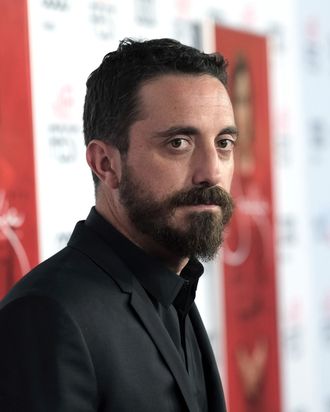
On Sunday, MoMA hosted an afternoon-long double feature of director Pablo Larrain’s highly anticipated upcoming releases, Neruda and Jackie. The screenings were part of MoMA’s The Contenders end-of-year film series, which is sponsored by The Hollywood Reporter and runs through January 12. Neruda, which opens December 16, is a drama based on the true story of Nobel Prize–winning poet Pablo Neruda (played by Luis Gnecco in the film), who became a fugitive after being ousted from Chile’s senate for his Communist beliefs. Gael García Bernal plays a fictional detective who embarks on a manhunt to capture the poet, finding himself wrapped in a cat-and-mouse game along the way.
Following the screening, Larrain and Bernal were on hand for a Q&A moderated by MoMA’s chief curator of film Rajendra Roy. With the film exploring the tense relationship between art and politics, it was tempting to watch Neruda through the lens of the current political landscape. “Neruda, although he was an incredibly political person, channeled his voice through his art, which created the greatest impact that it could have, one that maybe speaks to our current situation,” said Roy. Neruda produced bodies of work while in exile, and Larrain couldn’t help but contemplate the implications of such an act today: “Can we imagine, for example, a poet that would write about this candidate or the other one, and would dedicate a whole poem, and that’s over. I never thought that art can actually change things. But I believe, maybe because I just turned 40, there’s a way we could actually create a collective intention that could actually change something. I don’t know how. I’m more optimistic, nowadays, with what’s going on in the world. Art is even more important. Poetry tends to have a very important role there. Very transformative.”
Larrain admitted he’d been going back through Neruda’s work: “It seems that these guys were really trying to transform people’s ideology throughout the poetry. No one does that anymore.”
Bernal agreed. “I was born [in Mexico] in a very political time,” he said. “It’s always been a political time. In my generation, there’s been two huge evaluations together with huge political movements. All of this has made politics very much at the surface. Everything you do is political. What’s the big deal? Entertainment is political — let’s face it, it has to be. The human condition has a political complexity. It is part of everything.” A film script, he said, is a poem; actors, then, have to be poets. “Working with Pablo, there is an angle that we always talk about. There is a political angle. We open up with what we’re doing. Scripts have to be poems nowadays. We have the to play the game poets play, which is, show contradictions, show our existence, yet at the same time sublimate our hopes of being eternal. We play with that. We play with that in a safe way. We know that we are dealing with political questions. We don’t shy away from that.”
While Jackie will be Larrain’s first English-language production, Neruda is subtitled, which Larrain says preserves the art of the original poetry. “Some things with poetry are very hard to translate. Some people suggested to make this movie in English. You can’t. It’s already complicated. I’m sorry. You can’t translate poetry — you can, but it’s very limited. Neruda spoke five languages very well and never wrote in another language.”




